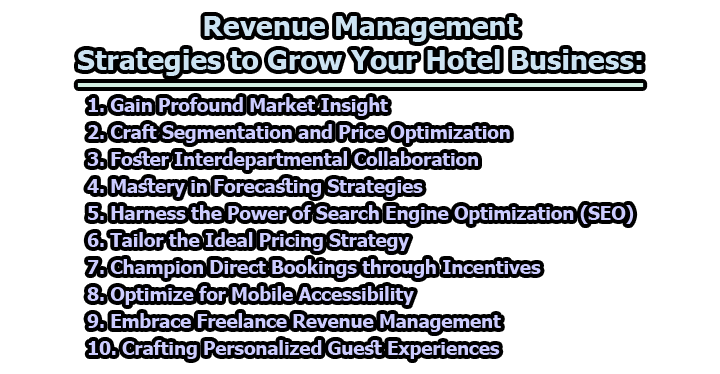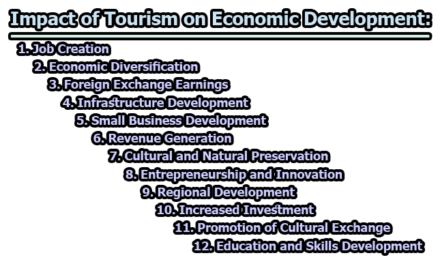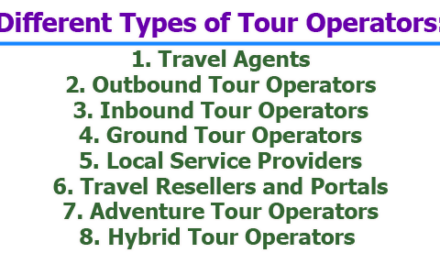In today’s fast-paced and fiercely competitive hospitality industry, the concept of revenue management has emerged as a critical driver of success for hotel businesses. This sophisticated approach involves the meticulous optimization of room sales, targeting the right customers at the right time, and ensuring optimal pricing to maximize profitability. In this comprehensive article, we will explore the revenue management strategies to grow your hotel business.
Understanding Revenue Management:
Revenue management stands as a strategic pillar within the hospitality industry, enabling hotels and resorts to enhance financial performance through a methodical approach. At its core, revenue management involves understanding market dynamics, adopting dynamic pricing strategies, and making well-informed decisions based on data-driven insights. This approach allows hotels to adapt pricing dynamically based on fluctuating demand and market conditions, rather than relying on static pricing models. With a focus on maximizing revenue while considering various factors, revenue management is a pivotal concept for hotels to master.
Revenue Management Strategies to Grow Your Hotel Business:
Below is a list of nine revenue management strategies you can use to grow your hotel business.
1. Gain Profound Market Insight: To effectively implement revenue management strategies, an in-depth understanding of the market is imperative. Identifying the sources of demand, comprehending seasonal trends, and analyzing competitors are fundamental aspects of market insight. This encompasses understanding the preferences, needs, and expectations of your target audience to tailor offerings that resonate with their desires. Moreover, acknowledging both direct and indirect competition is essential, as competition may come from unexpected sources, demanding a strategic approach to pricing and marketing decisions.
2. Craft Segmentation and Price Optimization: Segmentation and price optimization are at the heart of successful revenue management. Segmenting customers based on booking patterns, preferences, and behavior allows hotels to customize their pricing strategies. By aligning prices with the perceived value for each segment, hotels can create a consistent pricing structure that enhances guest loyalty. This consistency minimizes the need for frequent price changes and fosters guest satisfaction, ultimately leading to increased repeat business.
3. Foster Interdepartmental Collaboration: Collaboration among different hotel departments is a cornerstone of effective revenue management. Seamless alignment between sales, marketing, and operations ensures that revenue management strategies are integrated into the broader organizational strategy. Instead of imposing strategies, a collaborative approach involves involving key decision-makers from each department. This synergy guarantees consistent communication and a unified guest experience across all touch points.
4. Mastery in Forecasting Strategies: Accurate forecasting forms the backbone of revenue management. Combining historical data, occupancy trends, and industry insights enables hotels to anticipate demand fluctuations and make timely adjustments to pricing and availability. While historical patterns provide valuable insights, a holistic forecast incorporates current booking trends, competitor performance, local events, and industry trends. This dynamic approach to forecasting ensures a proactive response to changing market dynamics.
5. Harness the Power of Search Engine Optimization (SEO): In the digital age, search engine optimization (SEO) is a paramount strategy for attracting potential guests. A robust SEO strategy elevates your hotel’s online visibility, enabling your property to capture the attention of travelers who may not be specifically seeking your hotel. Through strategic content creation, optimized keywords, and mobile-friendly design, your hotel can secure higher rankings on search engine results pages (SERPs), resulting in increased direct bookings and improved online presence.
6. Tailor the Ideal Pricing Strategy: Selecting the appropriate pricing strategy is a nuanced art that requires careful consideration. Competitive pricing, aligning with rivals, positions your hotel in direct competition within the market. Conversely, a discount strategy proves beneficial during off-peak periods, filling rooms that would otherwise remain unoccupied. Alternatively, adopting a value-added approach justifies higher rates by offering additional benefits and amenities that enhance the overall guest experience.
7. Champion Direct Bookings through Incentives: While catering to various distribution channels is essential, prioritizing direct bookings offers numerous advantages. Direct bookings circumvent third-party commissions, resulting in higher revenue for your hotel. By offering exclusive incentives such as loyalty rewards or unique perks, you motivate guests to make direct bookings through your website. This not only strengthens guest loyalty but also contributes to increased revenue and a direct channel of communication with guests.
8. Optimize for Mobile Accessibility: Mobile optimization is no longer a luxury; it’s a necessity in the digital landscape. Given the significant portion of bookings made through mobile devices, ensuring that your website loads quickly, displays flawlessly, and offers a seamless booking process on mobile platforms is crucial. By providing a seamless mobile experience, you can cater to the preferences of tech-savvy travelers, boosting bookings and guest satisfaction.
9. Embrace Freelance Revenue Management: Leveraging the expertise of freelance revenue managers can introduce fresh perspectives and specialized knowledge to your hotel’s revenue management strategy. Unlike full-time hires, freelancers offer flexibility, adapting quickly to your business needs. Their experience and proficiency enable them to optimize revenue generation without the overhead associated with hiring and training a full-time employee. By collaborating with experienced freelancers, your hotel can enhance revenue management strategies cost-effectively.
10. Crafting Personalized Guest Experiences: In today’s hospitality landscape, personalization is a cornerstone of guest satisfaction. Integrating personalization into your revenue management strategy involves utilizing guest data to tailor offerings, amenities, and services to each individual’s preferences. Implementing a robust customer relationship management (CRM) system enables you to gather and analyze guest data effectively. By personalizing interactions and offerings, your hotel can create memorable experiences that resonate with guests, leading to increased loyalty and repeat business.
It is apparent that an effective revenue management strategy serves as a guiding light for navigating the complexities of the hotel industry. By understanding market dynamics, optimizing pricing, fostering collaboration, and embracing technology, your hotel can achieve sustained growth and success. These revenue management strategies, when executed strategically, empower your hotel to thrive amidst challenges and capitalize on opportunities. The evolving hospitality landscape necessitates continuous adaptation, underscoring the importance of proactive strategies in realizing your hotel’s potential.
Frequently Asked Questions (FAQs):
What is revenue management in the context of the hotel industry?
Revenue management in the hotel industry refers to the strategic approach of optimizing a hotel’s financial performance by selling the right room to the right customer at the right time for the right price. This involves utilizing data-driven insights to dynamically adjust pricing and offerings based on market demand and conditions.
Why is revenue management important for hotels?
Revenue management is essential for hotels due to the perishable nature of their inventory (hotel rooms), varying levels of demand, and fixed costs. It removes guesswork from pricing decisions, allowing hotels to maximize revenue by aligning pricing with demand fluctuations and market conditions.
How does market understanding impact revenue management?
Understanding the market is crucial for effective revenue management. It involves identifying sources of demand, recognizing seasonal trends, and understanding competition. This knowledge informs pricing, marketing, and strategic decisions, enabling hotels to optimize revenue generation.
How does segmentation and price optimization work in revenue management?
Segmentation involves categorizing customers based on factors like booking behavior and preferences. Price optimization tailors prices to match the perceived value for each customer segment. This approach promotes consistency in pricing, enhances customer loyalty, and minimizes the need for frequent price changes.
How does collaboration among hotel departments benefit revenue management?
Collaboration ensures alignment between departments such as sales, marketing, and operations. When revenue management strategies are harmonized with overall business goals, it results in consistent guest experiences and a unified organizational approach to revenue optimization.
What role does forecasting play in revenue management?
Forecasting is a critical aspect of revenue management, enabling hotels to anticipate demand fluctuations and make timely adjustments to pricing and availability. It involves analyzing historical data, occupancy trends, local events, and competitor performance to predict future demand accurately.
How does search engine optimization (SEO) impact revenue management?
SEO enhances a hotel’s online visibility by improving its search engine rankings. A well-executed SEO strategy allows hotels to attract guests who might not be actively searching for their property, leading to increased direct bookings and a broader reach.
What are the benefits of offering incentives for direct bookings?
Incentives, such as loyalty rewards or exclusive discounts, motivate guests to book directly through the hotel’s website. Direct bookings eliminate third-party commissions, leading to higher revenue. Moreover, direct bookings foster a direct relationship between the hotel and guests, enabling personalized interactions.
Why is mobile optimization crucial for revenue management?
With a significant number of bookings made via mobile devices, optimizing mobile accessibility is essential. A mobile-friendly website ensures seamless browsing, quick loading times, and easy booking processes, catering to the preferences of tech-savvy travelers.
How can freelance revenue managers contribute to revenue optimization?
Freelance revenue managers bring specialized expertise to hotels without the commitment of a full-time hire. Their experience and insights can be leveraged to fine-tune revenue management strategies, ensuring effective implementation and cost savings.
How does personalization enhance revenue management strategies?
Personalization involves tailoring offerings, services, and experiences to individual guest preferences. By utilizing guest data and CRM systems, hotels can create unique and memorable experiences that foster guest loyalty, resulting in repeat business and positive reviews.

Library Lecturer at Nurul Amin Degree College










